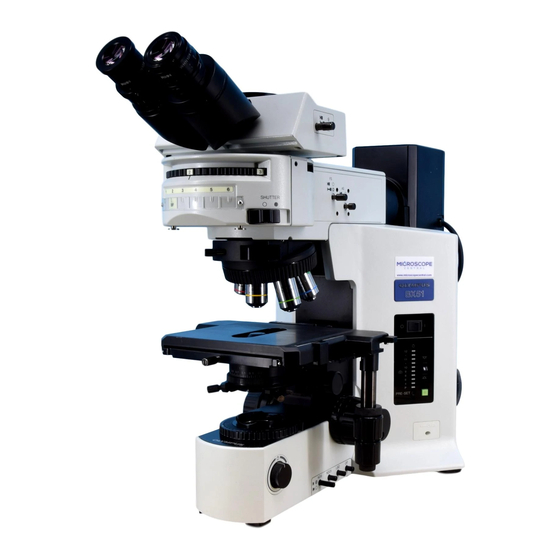- ページ 22
顕微鏡 Olympus BX51MのPDF 取扱説明書をオンラインで閲覧またはダウンロードできます。Olympus BX51M 36 ページ。 System metallurgical microscope

4-3 Reflected Light Simplified Polarized Light Observation
}For the preparation of reflected light simplified polarized light observation, perform the operation in "1 Setting the Analyzer
and Polarizer" in section 4-2, "Reflected Light Nomarski DIC Observation".
1
Observation Method
1. Place the specimen on the stage and adjust the focus by moving the stage up or down. Now simplified polarized light
observation can be started.
2. Adjust the field iris diaphragm so that its image circumscribes the field of view.
3. The contrast may sometimes be enhanced by closing the aperture iris diaphragm slightly.
19
U-DICRH
1. Adjust the background contrast by turning the prism movement knob |
on the DIC slider as described below. (Fig. 31)
2. When the prism movement knob on the U-DICRH DIC slider is turned,
the interference color in the background varies from -100 to 100 nm. Set
the retardation which can provide best contrast.
· Selecting a gray background color enables 3D-looking observation with
high contrast thanks to the highest sensibility of the gray sensitive color.
· Selecting a magenta sensitive color allows even small phase variation to
be observed as a change in color.
To select the magenta sensitive color as the background color, use the
U-POTP3 polarizer and insert it so that the
the front.
# Since the DIC observation has a high detection sensitivity, take care
against contamination on the specimen surface.
}The detection sensitivity is variable depending on direction so it is rec-
ommended to use a rotary stage.
4
Switching to Brightfield/Darkfield Observation
1. Loosen the mounting knob @ on the front of the DIC revolving nose-
piece, gently pull out the DIC slider ² until it clicks, then clamp by tight-
ening the mounting knob (Fig. 31).
2. Slide the analyzer (U-AN360-3) and polarizer to disengage them from the
light path.
indication can be seen from
